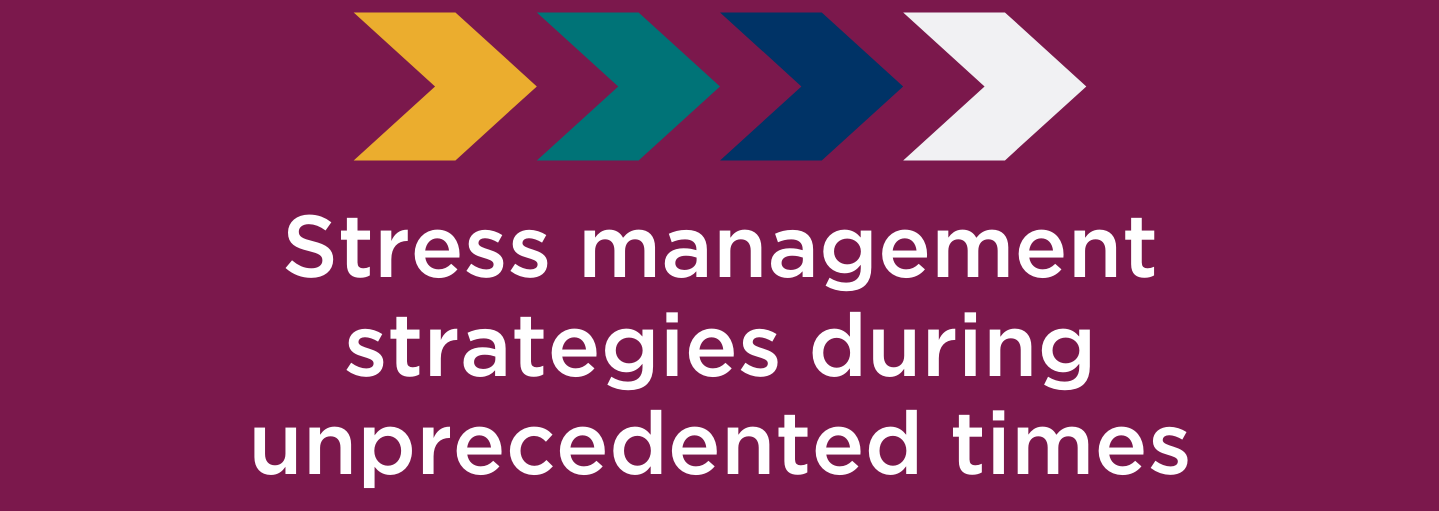Stress Management Strategies for Healthcare Workers

Back to physical health resource hub
Healthcare providers are prone to job-related stress, especially during extreme healthcare-related crises such as the COVID-19 pandemic. They are faced with organizational demands, patient demands, exposure to diseases, learning new skills and working with insurance regulations all while balancing personal and family life. Stress can have devastating effects on mental and physical health. There is a connection between persistent stress and physical complications such as muscle tension, pain, hypertension and illness. Emotional complications also develop ranging from apathy to severe depression.
You don’t have to work in an intense job to feel stress. Any ongoing situation that leaves you feeling unrelenting tension or fatigue has the potential to be a stressful situation. Changes due to the COVID-19 virus have affected us all. Employment has changed, finances have suffered, recreational outlets have been reduced and social support stymied. The home front that used to be the place to relax and unwind has turned into a school in one room and your office in another room. There are a myriad of reasons for stress to be building for us all.
This stress response is not new. Our ancient ancestors experienced this when faced with a life-or-death situation. A chain of events happens in the body in preparation to either stay and fight – or run for safety. Either way, the physiological and psychological response to stress prepares the body to react to the danger. Some of those responses involve changes in hormones, increased muscle tension, dilation in the eyes, increased acuity of hearing and changes in breathing – all designed to work together until the threat is resolved.
If the body remains on ‘high alert’ persistently, negative consequences are likely to develop. But what if the threat is persistent and doesn’t leave? What if the threat is a situation you can’t get out of and you live in a heightened stress response? Then having a strategy to change the way the body is responding to that stress is critical.
Here are some stress management strategies to try if you feel overwhelmed by the stress in your life:
 Movement: Exercise is a physical way to release neurotransmitters (endorphins) to reduce stress and anxiety. It is through exercise that you unlock your reserves of these neurotransmitters. Even though you will have some response after the first bout of exercise, the best effects for stress reduction occur when exercise is a routine practice. Aim for a routine of at least 150 minutes per week with moderate aerobic activity. The key really is the aerobic part. Lifting weights may give you the satisfaction of strength and power – but aerobic exercise gets you the chemical benefits mentioned above.
Movement: Exercise is a physical way to release neurotransmitters (endorphins) to reduce stress and anxiety. It is through exercise that you unlock your reserves of these neurotransmitters. Even though you will have some response after the first bout of exercise, the best effects for stress reduction occur when exercise is a routine practice. Aim for a routine of at least 150 minutes per week with moderate aerobic activity. The key really is the aerobic part. Lifting weights may give you the satisfaction of strength and power – but aerobic exercise gets you the chemical benefits mentioned above.
If you’ve been relying on the gym, this is an opportunity to try out a new exercise app, check out the neighborhood trail on a walk or dust off the bike that sits in the garage. Even yard work or housework may be the catalyst for aerobic exercise. As always, make sure you are physically ready for this level of activity, and consult your doctor and care team before starting.
Laugh: Oh to be a kid again and run around the yard just giggling and laughing at silly things. Living life in the moment; what a great life lesson our little ones could teach us. A healthy sense of humor can help you find joy amid adversity.
 Having a good laugh can reduce the production of stress hormones such as cortisol and epinephrine. Cortisol production changes throughout the day and is the lowest at night. It is present to support glucose metabolism, blood pressure stability, immune function and insulin release. In times of stress, cortisol increases to support greater demands with increased energy, improved memory and trigger a burst of greater immunity. However if it remains constantly elevated it can lead to impaired cognitive function, blood-sugar imbalances, hypertension, lowered immunity, increased inflammation and pain.
Having a good laugh can reduce the production of stress hormones such as cortisol and epinephrine. Cortisol production changes throughout the day and is the lowest at night. It is present to support glucose metabolism, blood pressure stability, immune function and insulin release. In times of stress, cortisol increases to support greater demands with increased energy, improved memory and trigger a burst of greater immunity. However if it remains constantly elevated it can lead to impaired cognitive function, blood-sugar imbalances, hypertension, lowered immunity, increased inflammation and pain.
Laughing can also ease tension and reduce pain. Laughter can increase the oxygen-rich circulation to the heart, lungs and muscles. In addition, multiple muscles are engaged with a hearty laugh. And after a good laugh, muscle relaxation ensues. Endorphins are released, which are our body’s own private stash of pain-relieving chemicals.
Not sure where to start? Consider making it a point to be around friends who make you laugh. If being there in person is challenging, then grab the smartphone and let technology link you together. Subscribe to an app that provides you with an endless supply of jokes to start your day. There is even a yoga practice built around laughing: Laughter Yoga. Check out Laughter Yoga on YouTube to see this in action.
 Breathe: One of the things we take for granted has powerful potential for our physical and emotional health. In times of stress, breathing becomes suppressed and shallow. Some may even unknowingly hold their breath. A mindful, intentional awareness of breathing could break this cycle and allow diaphragmatic breathing to be restored. A breathing practice could also focus on the sensations and movements of breathing with appreciation and gratitude. The function of breathing is so vital, but often overlooked. Breathing can lower blood pressure and heart rate, reduce levels of stress hormones, improve immune functions, improve the oxygen balance in the body and lead to deep relaxation.
Breathe: One of the things we take for granted has powerful potential for our physical and emotional health. In times of stress, breathing becomes suppressed and shallow. Some may even unknowingly hold their breath. A mindful, intentional awareness of breathing could break this cycle and allow diaphragmatic breathing to be restored. A breathing practice could also focus on the sensations and movements of breathing with appreciation and gratitude. The function of breathing is so vital, but often overlooked. Breathing can lower blood pressure and heart rate, reduce levels of stress hormones, improve immune functions, improve the oxygen balance in the body and lead to deep relaxation.
In line with these recommendations, Dr. Laura Wulff, a leading neuropsychologist at Brooks Rehabilitation, recommends these apps to help implement stress reduction strategies:
- Happify: “I like this app because it attempts to reduce stress and build happy skills for a healthy life via life-changing habits (based on science). It also has fun activities and games to enjoy. This app has many features that are free to use.”
- Breathe2Relax: “I like this app because it is simple. It focuses on the importance of breathing from your gut and accommodates specific people’s needs (e.g., breaths in and out, music, etc.). This app is entirely free to download and use.”
- Calm: “I like this app because it focuses on physiological strategies (not medications) to induce sleep. Specifically, it is a meditation and relaxation app that uses guided meditations, calming music and bedtime stories. This app has some features that are free to use, and I have found that they frequently sell the other features at reduced costs from time-to-time. So if you like the app, you can always be on the lookout for a sale price.”


